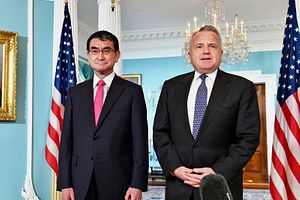Japan is pressing the United States and South Korea to pressure North Korea over the regime’s past abduction practices during forthcoming summits with Kim Jong-un. The diplomatic outreach has been interpreted as a sign that Tokyo fears its interests risk being downgraded during the highly anticipated leader-to-leader meetings expected to take place in April and May.
The fate of numerous Japanese citizens abducted by North Korean agents in the 1970s and 1980s remains politically sensitive in Japan. Kim’s father, Kim Jong-il, admitted in 2002 that 13 Japanese citizens had previously been taken by special forces in “a reckless quest for glory.” Five were allowed to return to Japan that year and the regime claimed the others had died – but relatives and the government doubt the official account. The Japanese government lists 17 citizens as abduction victims and has suspicions about other people who also vanished. It is pushing to secure the return of the other abductees. Prime Minister Shinzo Abe said recently that a resolution of the abduction, nuclear, and missile development issues was “Japan’s core policy.”
Japan wants to ensure the topic is raised by South Korean President Moon Jae-in and U.S. President Donald Trump during their respective meetings with the North Korean leader, which are expected to mainly focus on security issues and the push to denuclearize the peninsula. “Discussions are continuing concerning the format the inter-Korean summit meeting will take, but today we confirmed the necessity of the ROK [Republic of Korea, South Korea’s formal name] also working closely with Japan towards the resolution of the abductions issue,” Japanese Foreign Minister Taro Kono said after a meeting with his South Korean counterpart, Kang Kyung-wha, in Washington last Saturday. Similarly, after a separate meeting with U.S. Vice President Mike Pence on Friday, Kono said: ”We agreed that Japan and the United States will continue to closely cooperate in resolving the abduction issue.”
Kono and Kang’s recent visits to Washington come amid intense discussions between the United States and its regional allies aimed at ensuring the countries are on the same page in handling the North Korea talks. It remains to be seen the extent to which Pyongyang is truly committed to denuclearization, despite South Korean officials conveying such a message from their conversation with Kim in Pyongyang two weeks ago. Suh Hoon, the chief of South Korea’s National Intelligence Service, visited Tokyo last week to personally brief Abe and Kono on what Kim had said. Suh was one of the officials whose earlier briefing for Trump at the White House led to the announcement of plans for the first summit between U.S. and North Korean leaders.
Japan, which to date has been a strong supporter of the Trump administration’s “maximum pressure” campaign, holds that the Kim regime should not be given any concessions unless its words are backed up by concrete action. The United States and South Korea agree. “Sanctions will not be eased until the North agrees to detailed plans on denuclearization and takes action,” South Korea’s Kang told Yonhap News Agency during a subsequent visit to Brussels, where she discussed strategy with European Union colleagues. “In that process, the security guarantee for its regime that the North wants will also be discussed.”
In the same interview, Kang revealed some of her thinking about the potential outcomes of the Trump-Kim meeting. The South Korean foreign minister did not believe there was time to draw up a detailed roadmap toward denuclearization before the U.S.-North Korea summit, but indicated the leaders should aim to agree on an “overall outline” including a future timetable.
Japan is watching closely. Kono told reporters that the Kim regime would “probably take incremental actions towards denuclearization [so] we want to engage in close cooperation with the United States and the ROK to ensure that there are no inconsistencies in how we respond to any such actions by North Korea.” Even though Kono stressed that Tokyo, Seoul, and Washington were “in broad alignment in terms of how to respond,” Japan appears to be keeping its options open. Last week the Japanese government floated the idea of exploring its own future summit meeting with Kim, partly to pursue the abductions issue. With Abe traveling to the United States next month to coordinate with Trump, the government said it would “review its response from the perspective of the most effective approach.”

































